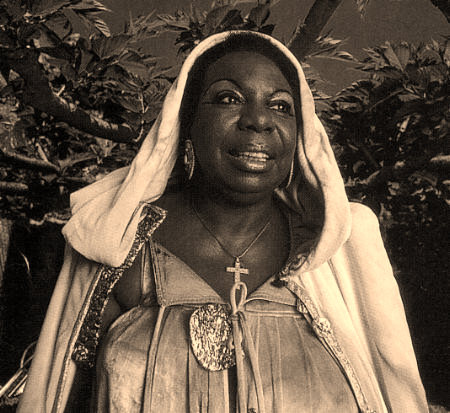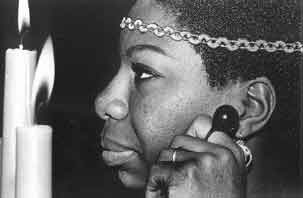NINA SIMONE / “Isn’t It A Pity”
These two songs are long-form Nina taken from Emergency Ward / It Is Finished / Black Gold a 2-CD collection of Nina’s last three LPs on the RCA label. Both selections, each over ten minutes long, are stellar examples of sustained intense expression done as only Nina can. Like church service, Nina throws her all in the pot as she conjures up a process that transform the physical into the spiritual.

 In these performances you can feel Nina roaming through the spirit world, her song a night-black-mare of emotions galloping full out, powerful and fleet, but also immense and deliberate. If you’ve never had the experience of catching the Holy Spirit, this is some of what it feels like.
The first selection improbably merges “My Sweet Lord,” a song by George Harrison of the Beetles and “Today Is A Killer,” a poem by Gylan Kain of the Original Last Poets, except this gospel arrangements sounds nothing like the Beetles and Nina’s reading of the poem sounds more like an improvised statement of determination rather than a reciting of poetry. Not just anybody can do this, can go on for nearly twenty minutes of singing and shouting, holding notes impossibly long, stuttering and twisting syllables into abstract symbols communicating both resignation and relief, uttering both shouts and sighs. Oh my God.
“Isn’t It A Pity” is more like a prayer, a plea when everything seems hopeless. A heartfelt laying down of burdens at the feet of the Lord. Clearly this is a song that is sung when conditions come forth that are beyond our abilities of comprehension. So we fling our incomprehension out into the universe and hope we hear back a communication from God, a sacred word or feeling that will let us know that what seems so hopeless is not totally lost cause.
In these performances you can feel Nina roaming through the spirit world, her song a night-black-mare of emotions galloping full out, powerful and fleet, but also immense and deliberate. If you’ve never had the experience of catching the Holy Spirit, this is some of what it feels like.
The first selection improbably merges “My Sweet Lord,” a song by George Harrison of the Beetles and “Today Is A Killer,” a poem by Gylan Kain of the Original Last Poets, except this gospel arrangements sounds nothing like the Beetles and Nina’s reading of the poem sounds more like an improvised statement of determination rather than a reciting of poetry. Not just anybody can do this, can go on for nearly twenty minutes of singing and shouting, holding notes impossibly long, stuttering and twisting syllables into abstract symbols communicating both resignation and relief, uttering both shouts and sighs. Oh my God.
“Isn’t It A Pity” is more like a prayer, a plea when everything seems hopeless. A heartfelt laying down of burdens at the feet of the Lord. Clearly this is a song that is sung when conditions come forth that are beyond our abilities of comprehension. So we fling our incomprehension out into the universe and hope we hear back a communication from God, a sacred word or feeling that will let us know that what seems so hopeless is not totally lost cause.
 All of the above and much more is what these examples of Nina’s song makes me feel. She reaches into the depths of me, stirs up memories decades old, describes deliberations I made yesterday looking upon the disaster that is post-Katrina New Orleans. How could she have been there in another century when I was teenager in a little church in New Orleans’ Ninth Ward and yet be so right-on here and now in my senior years dealing with the aftermath of the drowning of a metropolis?
I don’t know if I’ve helped you, dear reader, understand Nina Simone (or understand me) but hopefully, like the realness of another world that Kenneth and I recognized in Audrey writhing uncontrollably on the church floor, hopefully, you recognize there is another world and hopefully, as it does for me, hopefully for you this music is the vehicle for an all too brief visit (or at least fleeting sighting/sounding) into the emotional depths of the spirit world.
—Kalamu ya Salaam
A category of one
If you let me use both hands, I can count for you the number of times I've set foot in a church, mosque or synagogue. It's just not my thing. That said, I know a little bit about the spirit Kalamu is describing. If you listen to much black music, you can't help but hear it. (Aretha Franklin's mighty, mighty sixteen-minute performance of "Amazing Grace" comes to mind right away, but there are countless other examples.)
On a different note, given that Nina Simone is the most frequently posted artist here at Breath of Life, it should be obvious that both Kalamu and I are completely taken by her work. This time around, I want to comment on one specific aspect of Nina's style, and that is her spontaneity. Or maybe I should say, "her apparent spontaneity," because there is nothing I know of that proves that the spontaneity of hers wasn't planned.
I'm referring to the way Nina tends to deviate from the literal text of the song. Sometimes it's an ad-lib, adding something that isn't 'supposed' to be there. ("We've been programmed that way!" - Around 9:15 of "Isn't It A Pity.") Sometimes, it's unexpected silences. (They're all over the place. Just listen.) Sometimes, it's the odd way Nina holds or bends a note or word. ("Everything is plas...tic...kuh." Right near the end of "Pity.") Most amazing about Nina's deviations is that she does it all while sounding completely natural and self-assured. It never sounds gimmicky or forced. If you didn't know any better, you'd swear that both of these recordings were made in Nina's living room with her holding court at her piano, cigarette and drink within reach, her only audience a small group of close friends and associates.
It's both curious and oxymoronic that Nina often sounds so casual and unstudied. The extraordinary ease with which she performs belies a highly dedicated and very, very intense performer. If you've ever read or heard an interview of Nina's, you know that she takes both herself and her music very seriously. Almost to a fault, I'd say. The woman never suffered a fool, gladly or otherwise. It wasn't uncommon for her to interrupt an interview to inform an ignorant interviewer as to the exact breadth and depth of his or her ignorance.
Thinking about it now, we might say that Nina's well-practiced unaffectedness is 'Ali-esque' in both its impudence and effectiveness. Whether in the studio or on stage, the woman is honestly in a category of one: the greatest.
—Mtume ya Salaam
All of the above and much more is what these examples of Nina’s song makes me feel. She reaches into the depths of me, stirs up memories decades old, describes deliberations I made yesterday looking upon the disaster that is post-Katrina New Orleans. How could she have been there in another century when I was teenager in a little church in New Orleans’ Ninth Ward and yet be so right-on here and now in my senior years dealing with the aftermath of the drowning of a metropolis?
I don’t know if I’ve helped you, dear reader, understand Nina Simone (or understand me) but hopefully, like the realness of another world that Kenneth and I recognized in Audrey writhing uncontrollably on the church floor, hopefully, you recognize there is another world and hopefully, as it does for me, hopefully for you this music is the vehicle for an all too brief visit (or at least fleeting sighting/sounding) into the emotional depths of the spirit world.
—Kalamu ya Salaam
A category of one
If you let me use both hands, I can count for you the number of times I've set foot in a church, mosque or synagogue. It's just not my thing. That said, I know a little bit about the spirit Kalamu is describing. If you listen to much black music, you can't help but hear it. (Aretha Franklin's mighty, mighty sixteen-minute performance of "Amazing Grace" comes to mind right away, but there are countless other examples.)
On a different note, given that Nina Simone is the most frequently posted artist here at Breath of Life, it should be obvious that both Kalamu and I are completely taken by her work. This time around, I want to comment on one specific aspect of Nina's style, and that is her spontaneity. Or maybe I should say, "her apparent spontaneity," because there is nothing I know of that proves that the spontaneity of hers wasn't planned.
I'm referring to the way Nina tends to deviate from the literal text of the song. Sometimes it's an ad-lib, adding something that isn't 'supposed' to be there. ("We've been programmed that way!" - Around 9:15 of "Isn't It A Pity.") Sometimes, it's unexpected silences. (They're all over the place. Just listen.) Sometimes, it's the odd way Nina holds or bends a note or word. ("Everything is plas...tic...kuh." Right near the end of "Pity.") Most amazing about Nina's deviations is that she does it all while sounding completely natural and self-assured. It never sounds gimmicky or forced. If you didn't know any better, you'd swear that both of these recordings were made in Nina's living room with her holding court at her piano, cigarette and drink within reach, her only audience a small group of close friends and associates.
It's both curious and oxymoronic that Nina often sounds so casual and unstudied. The extraordinary ease with which she performs belies a highly dedicated and very, very intense performer. If you've ever read or heard an interview of Nina's, you know that she takes both herself and her music very seriously. Almost to a fault, I'd say. The woman never suffered a fool, gladly or otherwise. It wasn't uncommon for her to interrupt an interview to inform an ignorant interviewer as to the exact breadth and depth of his or her ignorance.
Thinking about it now, we might say that Nina's well-practiced unaffectedness is 'Ali-esque' in both its impudence and effectiveness. Whether in the studio or on stage, the woman is honestly in a category of one: the greatest.
—Mtume ya Salaam
This entry was posted on Sunday, February 11th, 2007 at 3:51 am and is filed under Classic. You can follow any responses to this entry through the RSS 2.0 feed. You can leave a response, or trackback from your own site.
3 Responses to “NINA SIMONE / “Isn’t It A Pity””
February 12th, 2007 at 12:03 am
Just when I thought “The Other Woman” was my favorite Nina Simone anthem, I am introduced to “Isn’t It A Pity.” The lyrics to this song forced the tears out of my eyes. Nina delivers as though asking us or maybe hoping that we’ll have the answer. Each word and grouping of words, slow, pensive, cutting. Immediately, I thought of all that I hadn’t Loved or refused to Love or should be prepared to Love. This is an indictment on the apathetic social condition of man. Wow!!! This is why Black music is the theology of the new African (descendants of the slave trade with European and Native DNA added). I Love this and I am buying this album tomorrow!
February 17th, 2007 at 7:59 am
It’s a real great song. thank you very much for the hint. I will order this collection.
with beth wishes
February 17th, 2007 at 1:05 pm
There’s reasons why Nina Simone was/is known as the “High Priestess of Soul” — she embodied all the spirituality, force, and attitude that Soul Music evoked in its many varieties. Another thing, of course, is that her performances spanned a range of genres and cannot be neatly fit into any one of them.
I saw her in concert only twice, occasions separated by at least ten years of passionate living. Yet, in each performance, I was struck by Nina’s absolutely sensual/sexy presence. I mean… just watching her stride to the piano got me “a little hot” inside. Once the show was on, I was her captive.
Nina Simone talked to us (African people) and the world-at-large with feeling, humor, and mother wit (wisdom). Her songs – no matter their original source, arrangement, or purpose – became our voice, our scream, our unrestrained psychic energy. Nina shouted for us, and shouted back at the powers that be. Even as she whispered eternal love, her hand was raised in a defiant clenched fist. What a woman!
Damn… what a woman!
Leave a Reply
| top |